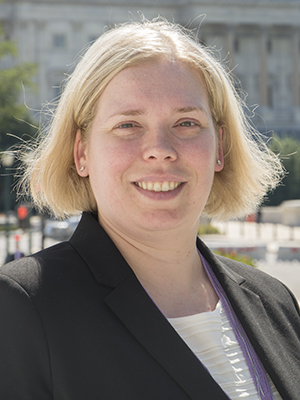
 By Associate General Counsel Jennifer Hawks
By Associate General Counsel Jennifer Hawks
With the 2016 presidential candidates named for the Democratic, Republican, Green, Libertarian and about a dozen other parties, the American political season is in full swing. What this means for the BJC is an increase in questions about political activity of churches and pastors. Here are answers to three of these frequently asked questions that you or your church might find helpful as you work to faithfully navigate this year’s elections.
Why do some people say that churches cannot be involved in politics?
Actually, they can be, but not with tax-exempt dollars. Churches are usually 501(c)(3) tax-exempt entities, which means that your tithes and financial contributions to the church are tax deductible. Tax deduction is one of the greatest benefits for 501(c)(3) entities, and not every nonprofit organization falls into this category. For example, contributions to a candidate’s campaign or a political action committee would not be deductible by the donor. Churches and pastors acting in their pastoral capacities can speak as much as they want about the issues of the day, but they are not permitted to endorse or oppose candidates. This limitation applies to all 501(c)(3) entities, which comprise a variety of religious, educational, charitable and scientific organizations. Violation of this IRS regulation does not lead to imprisonment or criminal prosecution, but rather could result in a loss of the church’s 501(c)(3) tax status.
What about pastors who are personally endorsing candidates?
Pastors, in their individual capacities, are absolutely permitted to endorse or oppose political candidates as long as church resources are not used and it is clear that the pastor is speaking or acting in an individual capacity and not for the church. Though legally permissible, this is an area where church leaders should be cautious. Personal endorsements may prevent a pastor’s moral or prophetic message from being heard. When past or future scandals emerge, pastors who personally endorsed these candidates may find themselves in an untenable position of walking back their personal support and unable to credibly speak out against similar misbehavior by other civic leaders. If a pastor is known for only endorsing candidates of one political party and then attempts to speak prophetically about the negative effects of policies from the other party, he or she may be met with extreme skepticism or dismissed as a partisan hack instead of being seen as Christ’s representative.
How can my church be involved in elections?
Churches can be political influencers in at least three concrete ways without running afoul of the 501(c)(3) rules or the separation of church and state. Churches can:
1) Provide a theological lens through which the issues of the day can be analyzed. Leaders can preach about issues that matter to people of faith, including justice, care for the poor, life, God’s creation, family or charity, providing a depth that is often lacking in our 140-character culture.
2) Host nonpartisan voter registration drives and “get out the vote” drives. Church members can go into the community or even set up a registration booth at a local fair but shouldn’t steer the registrants to one party or the other. They can also provide transportation to the voting location if there is no condition on the person voting a certain way.
3) Invite candidates to speak either as candidates or in their individual capacities. Church leaders should affirmatively declare that the church does not endorse candidates. If inviting candidates to speak as candidates, the church should invite all candidates for that office to participate on an equal basis. For example, a church should not invite one candidate to preach on a Sunday morning with an average attendance of 250 while inviting the opposing candidate to speak during a Wednesday night supper with an average attendance of 25. If a candidate is invited in an individual capacity to speak on an issue of personal or professional expertise, no mention should be made of the candidacy or upcoming election by the church or the candidate. Simply put, if a church invites a candidate to speak, invite all candidates equally. If a church invites someone to speak who happens to be a candidate, don’t allow the occasion to be a forum for talk about an election.
This list is by no means exhaustive. Many ways exist for churches to participate in an election cycle without violating the 501(c)(3) rules or compromising their prophetic voice. The separation of church and state does not exclude religious voices from the public square, but most congregants want their tithes to be used to promote Kingdom goals, not a candidate’s agenda. The church has a permanency that should not be traded for the roller coaster of the ever-changing political agenda.
For more resources on churches and political campaigns, visit our website page on the topic: BJConline.org/electioneering
From the July/August 2016 edition of Report from the Capital. You can also read the digital version of the magazine or view it as a PDF.




